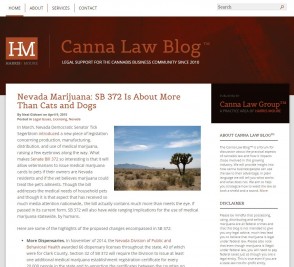Tips for starting a law firm or legal blog
 Much of the time, a blog is used to increase search engine ranking and brand awareness, which brings us into the ongoing debate about whether stand-alone blogs or website blogs are better. As an attorney, you and your blog are held to ethical standards that most bloggers aren’t. Your blog is subject to the rules and regulations of commercial speech so you have far-more to consider than the average blogger.
Much of the time, a blog is used to increase search engine ranking and brand awareness, which brings us into the ongoing debate about whether stand-alone blogs or website blogs are better. As an attorney, you and your blog are held to ethical standards that most bloggers aren’t. Your blog is subject to the rules and regulations of commercial speech so you have far-more to consider than the average blogger.
Think about this: An attorney in Illinois was brought up before the Disciplinary Committee for revealing a client’s confidences. The attorney was blogging about her client’s cases and referring to her clients by some derivative of their first name or by their inmate identification. The attorney’s posts went far beyond some of the more common “case study” type posts you may have seen, and even included dialogue and other sensitive information, all without the client’s permission. Her blogging technique got her suspended from practice.
The case of a Virginia attorney went to the State Supreme Court after the Bar determined his blog was a commercial vehicle, much like a website. The High Court determined that his blog was commercial speech because the majority of his posts were about his successes, his blog carried the same marketing messages and promoted the same services as his website, the blog was a subdomain of his website, and he had disabled comments.
Some do’s and don’ts in legal blogging
There are some things you should never do in your legal blog (or on your website). You should absolutely never discuss a client or their case online without that client’s permission, not even if you use only their initials and change other aspects to make the client less identifiable. Even though this is common knowledge, you’ve probably seen legal blogs with “case studies” highlighting attorney successes, and maybe you’ve considered posting a couple of your own. Before you do, decide if how you plan to discuss the cases makes it seem as though you are promoting your services or marketing yourself. If you’re promoting yourself, your firm, or your services, is it necessary to use the cases to do so? Is anything in the case study sensitive? Could your client be harmed or even embarrassed by the information in your blog? Weigh these considerations carefully.
Blogs that are published on a subdomain of your website, especially if that blog has the same design as the website, may be more likely to be considered commercial speech. If you’re using your blog as a marketing vehicle, say by including pitches and selling points, it should probably be published with your website.
If you’re using a stand-alone blog, one with a different address than your website, consider forgoing the direct selling or marketing pitches. A stand-alone blog should show your readers that you’re interested and competent in your subject matter, and comments should be allowed for the purpose of peer and community engagement.
Don’t ever forget your readers
Outdated blog can push your readers straight to your competition. So can a boring one. The moment you forget that you’re writing for an audience, you’ll probably start to lose that audience. You have to keep your readers engaged. Sound difficult? Check out the CannaLawBlog.com published by Harris Moure. This blog nails not only the concept of quality legal blogging, but they also cover their beat like pros, reporting on all aspects of the cannabis industry. In the “About” section of the blog, notice there are no marketing pitches or sales prompts, instead the firm calls the blog a “forum for discussion” of the legalities surrounding canna business.
The Canna Law Blog is an excellent example of how the news, legal developments, laws, and cases can be tied together in a way that enhances the authority of the firm as well as the trust level of clients and readers. Follow their example and report on your beat. You already know most of the ins and outs, so use them to engage with your readers, clients, peers, and potential clients.
Free Speech protects most bloggers, but as an attorney, you have a different set of rules to follow with online conduct. Know those rules, play by those rules (make sure your marketing company or blog writers play by those same rules too), and write for your readers. Always.


Leave a Reply